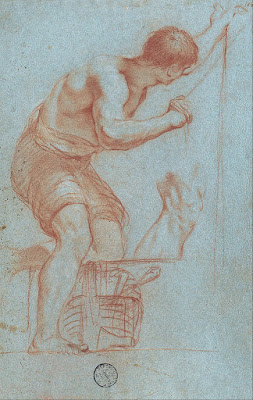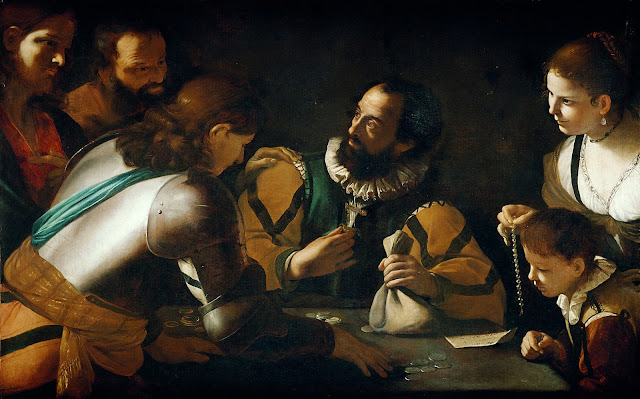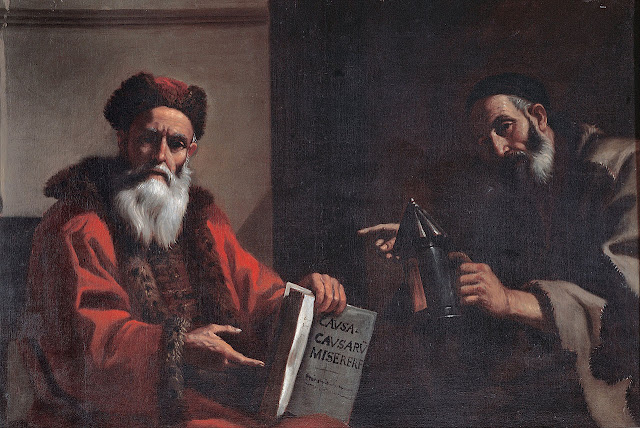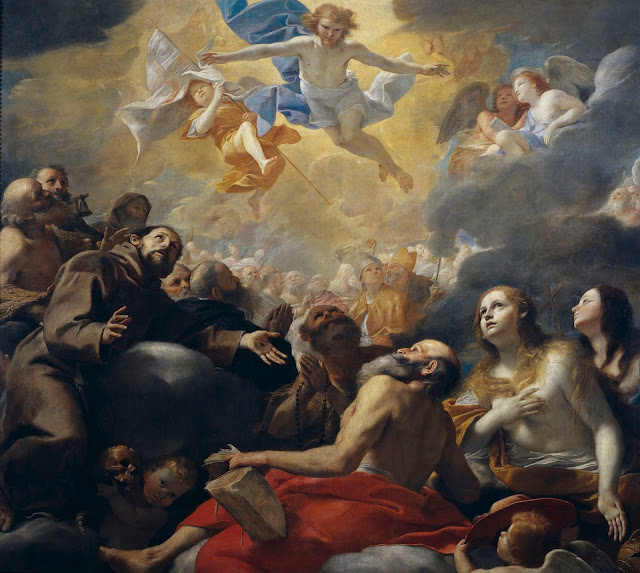 |
| Mattia Preti Workman with cord before 1699 drawing Museum Kunstpalast, Düsseldorf |
 |
| Mattia Preti Flying Angel with book before 1699 drawing Museum Kunstpalast, Düsseldorf |
 |
| Mattia Preti Angel blowing trumpet ca. 1652 drawing Getty Museum, Los Angeles |
"Although Mattia Preti (1613-1699) spent much of his life elsewhere, he is traditionally associated with the city of Naples. Together with Luca Giordano, Preti extended the reputation of Neapolitan painting throughout Italy and internationally. Originally from Calabria in southern Italy, Preti went to Rome around 1630, sharing a room with his brother Gregorio who had arrived about two years earlier. Gregorio may have been Mattia's principal teacher, although they both also studied at the Accademia di San Luca.
While in Rome during the 1630s and 1640s, Preti achieved his first success. His easel paintings, particularly his early ones, are painted in the style of Caravaggio. His mature style, which reached its epitome in Naples from 1653 to 1660, is intensely dramatic, uniting a Caravaggesque realism and expressive chiaroscuro with the grandeur and theatricality of Venetian artists like Paolo Veronese and Tintoretto. In 1661 Preti went to the island of Malta, where he remained for the rest of his life. While receiving most of the island's church commissions, he also worked for patrons across Europe. Preti's contributions to the late Baroque style in Naples greatly inspired later painters, notably Francesco Solimena."
– biographical notes from the Getty Museum
 |
| Mattia Preti Doubting Thomas ca. 1656-60 oil on canvas Kunsthistorisches Museum, Vienna |
 |
| Mattia Preti Calling of Matthew ca. 1635-40 oil on canvas Kunsthistorisches Museum, Vienna |
 |
| Mattia Preti Feast of Herod ca. 1656-61 canvas Toledo Museum of Art, Ohio |
"For Herod himself had sent forth and laid hold upon John, and bound him in prison for Herodias' sake, his brother Philip's wife: for he had married her. For John had said unto Herod, It is not lawful for thee to have thy brother's wife. Therefore Herodias had a quarrel against him, and would have killed him; but she could not: for Herod feared John, knowing that he was a just man and an holy, and observed him; and when he heard him, he did many things, and heard him gladly. And when a convenient day was come, that Herod on his birthday made a supper to his lords, high captains, and chief estates of Galilee; and when the daughter of the said Herodias came in, and danced, and pleased Herod and them that sat with him, the king said unto the damsel, Ask of me whatsoever thou wilt, and I will give it thee. And he sware unto her, Whatsoever thou shalt ask of me, I will give it thee, unto the half of my kingdom. And she went forth, and said unto her mother, What shall I ask? And she said, the head of John the Baptist. And she came in straightway with haste unto the king, and asked, saying, I will that thou give me by and by in a charger the head of John the Baptist. And the king was exceedingly sorry; yet for his oath's sake, and for their sakes which sat with him, he would not reject her. And immediately the king sent an executioner, and commanded his head to be brought: and he went and beheaded him in the prison, and brought his head in a charger, and gave it to the damsel: and the damsel gave it to her mother."
– from the book of Mark, chapter 6, verses 17-29 of the King James Bible, first published in 1611
 |
| Mattia Preti St Veronica with Veil ca. 1655-60 oil on canvas Los Angeles County Museum of Art |
 |
| Mattia Preti Erminia, Princess of Antioch (character in Tasso's Gerusalemme Liberata, 1581) ca. 1655-60 oil on canvas private collection |
 |
| Mattia Preti Clorinda rescues Olindo and Sophronia from the Stake (scene from Gerusalemme Liberata by Torquato Tasso, 1581) 1646 oil on canvas Musei di Strada Nuova, Genoa |
When near the fatal place the virgin drew
And the dire scene appear'd before her view
She spurred her steed t'observe the victims nigh,
And learn th'unhappy cause for which they die.
The yielding crowd gave way: the curious maid
With steadfast eyes the pair in bonds surveyed.
One mourn'd aloud, and one in silence stood,
The weaker sex the great firmness show'd:
Yet seem'd Olindo like a man to moan
Who wept another's sufferings, not his own;
While silent she, and fix'd on heaven her eyes,
Already seemed to claim her kindred skies.
Clorinda view'd their fate with tender woe,
And down her cheeks the tears began to flow:
Yet most she griev'd for her who grief disdain'd,
And silence, more than plaints, her pity gained.
Then to an aged sire who stood beside,
Say, who are those to death devote (she cry'd).
Declare what brought them to this woeful state,
Some secret crime, or blind decree of fate?
Thus she. The reverend sire in brief display'd
Their mournful story to the listening maid:
She heard, surpriz'd such matchless worth to find,
And both aquitted in her equal mind.
To save from threatened death th'unhappy pair
She ran, she stopp'd the flame with eager haste
(Already kindling) and the guards addres'd:
"None in this cruel office dare to move,
Till to the monarch I my suit approve:
My power, believe me, shall protect your stay,
Nor shall your sovereign chide your short delay."
– from Jerusalem Delivered : an Heroic Poem (book 2) translated from the Italian of Torquato Tasso by John Hoole (London : J. Dodsley, 1787)
 |
| Mattia Preti Plato and Diogenes 1649 oil on canvas Pinacoteca Capitolina, Rome |
 |
| Mattia Preti Crucifixion of St Andrew ca. 1651 oil on canvas Art Gallery of South Australia, Adelaide |
 |
| Mattia Preti Death of Sophonisba ca. 1650-70 oil on canvas Musée des Beaux-Arts de Lyon |
SOPHONISBA –
"Alas, Corisba, Fate hath vowed my ruin,
And human power collides with that of heaven.
The gods, whom doubtless my good fortune wearied,
Are not yet satisfied by my past misfortunes,
And I myself dare prophecy to myself
That they reserve for me still something worse.
The dreams that I have had the last few nights
Foretell for me no ordinary woes,
And what assures me better of their truth
Is that I who, far from believing in dreams,
Have always held them lying and absurd,
Produced by an excess of heavy vapors,
Cannot prevent myself from crediting
These last ones, which are all of evil omen."
– from Sophonisba : A Tragedy by Jean Mairet (1634)
 |
| Mattia Preti Martyrdom of St Paul ca. 1654-61 oil on canvas Museum of Fine Arts, Houston |
 |
| Mattia Preti Votive design for plague relief with Madonna and Child (bozzetto for fresco) 1656 oil on canvas Museo Nazionale di Capodimonte, Naples |
 |
| Mattia Preti Christ in Glory with Saints ca. 1660-61 oil on canvas Prado, Madrid |
 |
| Mattia Preti Baptism of Christ 1661 ceiling fresco St John's Co-Cathedral, Valletta, Malta |